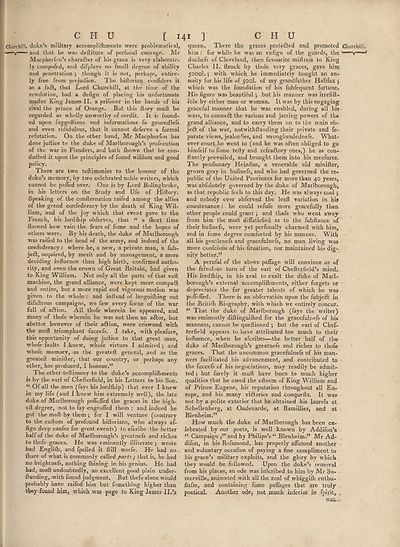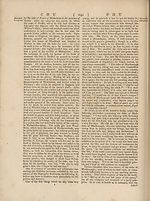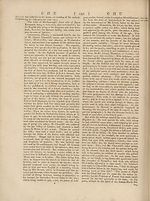Encyclopaedia Britannica, or, a Dictionary of arts, sciences, and miscellaneous literature : enlarged and improved. Illustrated with nearly six hundred engravings > Volume 6, CHI-Crystallization
(151) Page 141
Download files
Complete book:
Individual page:
Thumbnail gallery: Grid view | List view

C H U [ 141 ] C H U
Churchill, duke’s military accomplifhments were problematical,
' and that he was deflitute of perfonal courage. Mr
Macpberfon’s chara£ter of his grace is very elaborate¬
ly compofed, and difplays no fmall degree of ability
and penetration ; though it is not, perhaps, entire¬
ly free from prejudice. The hiftorian eonfiders it
as a fa&, that Lord Churchill, at the time of the
revolution, had a defign of placing his unfortunate
matter King James II. a prifoner in the hands of his
rival the prince of Orange. But this ftory mutt be
regarded as wholly unworthy of credit. It is found¬
ed upon fuggeftions and informations fo groundlefs
and even rididulous, that it cannot deferve a formal
refutation. On the other hand, Mr Macpherfon has
donejufticeto the duke of Marlborough’s profecution
of the war in Flanders, and hath fhown that he con-
duffed it upon the principles of found wifdom and good
policy.
There are two teftimonies to the honour of the
duke’s memory, by two celebrated noble writers, which
cannot be patted over. One is by Lord Bolingbroke,
in his letters on the Study and Ufe of Hiftory.
Speaking of the contternation raifed among the allies
of the grand confederacy by the death of King Wil¬
liam, and of the joy which that event gave to the
French, his lordlhip obferves, that “ a (hurt time
flrowed how vain the fears of fome and the hopes of
others were. By his death, the duke of Marlborough
was raifed to the head of the army, and indeed of the
confederacy : where he, a new, a private man, a fub-
jeff, acquired, by merit and by management, a more
deciding influence than high birth, confirmed autho¬
rity, and even the crown of Great Britain, had given
to King William. Not only all the parts of that vaft
machine, the grand alliance, were kept more compafl
and entire, but a more rapid and vigorous motion w’as
given to the whole : and inftead of languittiing out
difattrous campaigns, we faw every fcene of the war
full of affion. All thofe wherein he appeared, and
many of thofe wherein he was not then an after, but
abettor however of their aftion, were crowned with
the moft triumphant fuccefs. I take, with pleafure,
this opportunity of doing juftice to that great man,
whofe faults I knew, whofe virtues I admired ; and
whofe memory, as the greateft general, and as the
greatett minitter, that our country, or perhaps any
other, has produced, I honour.”
The other teftimony to the duke’s accomplifliments
is by the earl of Chefterfield, in his Letters to his Son.
“ Of all the men (fays his lordfhip) that ever I knew
in my life (and I knew him extremely well), the late
duke of Marlborough pottfetted the graces in the high-
eft degree, not to fay engrofled them : and indeed he
got the moft by them ; for I will venture (contrary
to the cuftom of profound hiftorians, who always af-
fign deep caufes for great events) to aferibe the better
half of the duke of Marlborough’s greatnefs and riches
to thofe graces. He was eminently illiterate $ wrote
bad Englifti, and fpelled it ftill worfe. He had no
Ihare of what is commonly called parts ; that is, he had
no brightnefs, nothing ftiining in his genius. He had
had, moft undoubtedly, an excellent good plain under-
ftanding, with found judgment. But thefe alone would
probably have raifed him but fomething higher than
they found him, which was page to King James II.’s
queen. There the graces protefted and promoted Churchill,
him : for while he was an enfign of the guards, the -■ v—■ ■■■<
duehefs of Cleveland, then favourite miftreis to King
Charles II. ftruck by thofe very graces, gave him
5000I.; with which he immediately bought an an¬
nuity for his life of 500I. of my grandfather Halifax j
which was the foundation of his fubfequent fortune.
His figure was beautiful $ but his manner was irrefift-
ible by either man or woman. It was by this engaging
graceful manner that he was enabled, during all his
wars, to conneft the various and jarring powers of the
grand alliance, and to carry them on to the main ob-
jeft of the war, notwithftanding their private and fe-
parate views, jealoufies, and wrongbeadednefs. What¬
ever court he went to (and he was often obliged to go
himfelf to fome tefty and refraftory ones,) he as con-
ftantly prevailed, and brought them into bis meafures.
The penfionary Heinfius, a venerable old minifter,
grown gray in bufinefs, and who had governed the re¬
public of the United Provinces for more than 40 years,
was abfolutely governed by the duke of Marlborough,
as that republic feels to this day. He was always cool j
and nobody ever obferved the leaft variation in his
countenance: he could refufe more gracefully than
other people could grant j and th«fe who went away
from him the moft diflatisfied as to the fubftance of
their bufinefs, were yet perfonally charmed with him,
and in fome degree comforted by his manner. With
all his gentlenefs and gracefulnefs, no man living was
more confcious of his lituation, nor maintained his dig¬
nity better.”
A perufal of the above paffage will convince us of
the frivolous turn of the earl of Chefterfield’s mind.
His lordfhip, in his zeal to exalt the duke of Marl¬
borough’s external accomplilhments, either forgets or
depreciates the far greater talents of which he was
pottfettfed. There is an obfervation upon the fubjeft in
the Britifh Biography, with which we entirely concur.
“ That the duke of Marlborough (fays the writer)
was eminently diftinguifhed for the gracefulnefs of his
manners, cannot be queftioned $ but the earl of Chef¬
terfield appears to have attributed too much to their
influence, when he aferibes—the better half of the
duke of Marlborough’s greatnefs and riches to thofe
graces. That the uncommon gracefulnefs of his man¬
ners facilitated his advancement, and contributed to
the fuccefs of his negociations, may readily be admit¬
ted ; but furely it muft have been to much higher
qualities that he owed the efteem of King William and
of Prince Eugene, his reputation throughout all Eu¬
rope, and his many viftories and conquefts. It was
not by a polite exterior that he obtained his laurels at
Schellenberg, at Oudenarde, at Ramillies, and at
Blenheim.”
How much the duke of Marlborough has been ce¬
lebrated by our poets, is well known by Addifon’s
“ Campaign and by Philips’s “ Blenheim.” Mr Ad-
difon, in his Rofamond, has properly aflumed another
and voluntary occafion of paying a fine compliment to
his grace’s military exploits, and the glory by which
they would be followed. Upon the duke’s removal
from his places, an ode was inferibed to him by Mr So- -
merville, animated with all the zeal of whiggilh enthu-
fiafm, and containing fome palfages that are truly
poetical. Another ode, not much inferior in fpirit, ,
wax -
Churchill, duke’s military accomplifhments were problematical,
' and that he was deflitute of perfonal courage. Mr
Macpberfon’s chara£ter of his grace is very elaborate¬
ly compofed, and difplays no fmall degree of ability
and penetration ; though it is not, perhaps, entire¬
ly free from prejudice. The hiftorian eonfiders it
as a fa&, that Lord Churchill, at the time of the
revolution, had a defign of placing his unfortunate
matter King James II. a prifoner in the hands of his
rival the prince of Orange. But this ftory mutt be
regarded as wholly unworthy of credit. It is found¬
ed upon fuggeftions and informations fo groundlefs
and even rididulous, that it cannot deferve a formal
refutation. On the other hand, Mr Macpherfon has
donejufticeto the duke of Marlborough’s profecution
of the war in Flanders, and hath fhown that he con-
duffed it upon the principles of found wifdom and good
policy.
There are two teftimonies to the honour of the
duke’s memory, by two celebrated noble writers, which
cannot be patted over. One is by Lord Bolingbroke,
in his letters on the Study and Ufe of Hiftory.
Speaking of the contternation raifed among the allies
of the grand confederacy by the death of King Wil¬
liam, and of the joy which that event gave to the
French, his lordlhip obferves, that “ a (hurt time
flrowed how vain the fears of fome and the hopes of
others were. By his death, the duke of Marlborough
was raifed to the head of the army, and indeed of the
confederacy : where he, a new, a private man, a fub-
jeff, acquired, by merit and by management, a more
deciding influence than high birth, confirmed autho¬
rity, and even the crown of Great Britain, had given
to King William. Not only all the parts of that vaft
machine, the grand alliance, were kept more compafl
and entire, but a more rapid and vigorous motion w’as
given to the whole : and inftead of languittiing out
difattrous campaigns, we faw every fcene of the war
full of affion. All thofe wherein he appeared, and
many of thofe wherein he was not then an after, but
abettor however of their aftion, were crowned with
the moft triumphant fuccefs. I take, with pleafure,
this opportunity of doing juftice to that great man,
whofe faults I knew, whofe virtues I admired ; and
whofe memory, as the greateft general, and as the
greatett minitter, that our country, or perhaps any
other, has produced, I honour.”
The other teftimony to the duke’s accomplifliments
is by the earl of Chefterfield, in his Letters to his Son.
“ Of all the men (fays his lordfhip) that ever I knew
in my life (and I knew him extremely well), the late
duke of Marlborough pottfetted the graces in the high-
eft degree, not to fay engrofled them : and indeed he
got the moft by them ; for I will venture (contrary
to the cuftom of profound hiftorians, who always af-
fign deep caufes for great events) to aferibe the better
half of the duke of Marlborough’s greatnefs and riches
to thofe graces. He was eminently illiterate $ wrote
bad Englifti, and fpelled it ftill worfe. He had no
Ihare of what is commonly called parts ; that is, he had
no brightnefs, nothing ftiining in his genius. He had
had, moft undoubtedly, an excellent good plain under-
ftanding, with found judgment. But thefe alone would
probably have raifed him but fomething higher than
they found him, which was page to King James II.’s
queen. There the graces protefted and promoted Churchill,
him : for while he was an enfign of the guards, the -■ v—■ ■■■<
duehefs of Cleveland, then favourite miftreis to King
Charles II. ftruck by thofe very graces, gave him
5000I.; with which he immediately bought an an¬
nuity for his life of 500I. of my grandfather Halifax j
which was the foundation of his fubfequent fortune.
His figure was beautiful $ but his manner was irrefift-
ible by either man or woman. It was by this engaging
graceful manner that he was enabled, during all his
wars, to conneft the various and jarring powers of the
grand alliance, and to carry them on to the main ob-
jeft of the war, notwithftanding their private and fe-
parate views, jealoufies, and wrongbeadednefs. What¬
ever court he went to (and he was often obliged to go
himfelf to fome tefty and refraftory ones,) he as con-
ftantly prevailed, and brought them into bis meafures.
The penfionary Heinfius, a venerable old minifter,
grown gray in bufinefs, and who had governed the re¬
public of the United Provinces for more than 40 years,
was abfolutely governed by the duke of Marlborough,
as that republic feels to this day. He was always cool j
and nobody ever obferved the leaft variation in his
countenance: he could refufe more gracefully than
other people could grant j and th«fe who went away
from him the moft diflatisfied as to the fubftance of
their bufinefs, were yet perfonally charmed with him,
and in fome degree comforted by his manner. With
all his gentlenefs and gracefulnefs, no man living was
more confcious of his lituation, nor maintained his dig¬
nity better.”
A perufal of the above paffage will convince us of
the frivolous turn of the earl of Chefterfield’s mind.
His lordfhip, in his zeal to exalt the duke of Marl¬
borough’s external accomplilhments, either forgets or
depreciates the far greater talents of which he was
pottfettfed. There is an obfervation upon the fubjeft in
the Britifh Biography, with which we entirely concur.
“ That the duke of Marlborough (fays the writer)
was eminently diftinguifhed for the gracefulnefs of his
manners, cannot be queftioned $ but the earl of Chef¬
terfield appears to have attributed too much to their
influence, when he aferibes—the better half of the
duke of Marlborough’s greatnefs and riches to thofe
graces. That the uncommon gracefulnefs of his man¬
ners facilitated his advancement, and contributed to
the fuccefs of his negociations, may readily be admit¬
ted ; but furely it muft have been to much higher
qualities that he owed the efteem of King William and
of Prince Eugene, his reputation throughout all Eu¬
rope, and his many viftories and conquefts. It was
not by a polite exterior that he obtained his laurels at
Schellenberg, at Oudenarde, at Ramillies, and at
Blenheim.”
How much the duke of Marlborough has been ce¬
lebrated by our poets, is well known by Addifon’s
“ Campaign and by Philips’s “ Blenheim.” Mr Ad-
difon, in his Rofamond, has properly aflumed another
and voluntary occafion of paying a fine compliment to
his grace’s military exploits, and the glory by which
they would be followed. Upon the duke’s removal
from his places, an ode was inferibed to him by Mr So- -
merville, animated with all the zeal of whiggilh enthu-
fiafm, and containing fome palfages that are truly
poetical. Another ode, not much inferior in fpirit, ,
wax -
Set display mode to:
![]() Universal Viewer |
Universal Viewer | ![]() Mirador |
Large image | Transcription
Mirador |
Large image | Transcription
Images and transcriptions on this page, including medium image downloads, may be used under the Creative Commons Attribution 4.0 International Licence unless otherwise stated. ![]()
| Permanent URL | https://digital.nls.uk/193009386 |
|---|
| Attribution and copyright: |
|
|---|
| Description | Ten editions of 'Encyclopaedia Britannica', issued from 1768-1903, in 231 volumes. Originally issued in 100 weekly parts (3 volumes) between 1768 and 1771 by publishers: Colin Macfarquhar and Andrew Bell (Edinburgh); editor: William Smellie: engraver: Andrew Bell. Expanded editions in the 19th century featured more volumes and contributions from leading experts in their fields. Managed and published in Edinburgh up to the 9th edition (25 volumes, from 1875-1889); the 10th edition (1902-1903) re-issued the 9th edition, with 11 supplementary volumes. |
|---|---|
| Additional NLS resources: |
|

